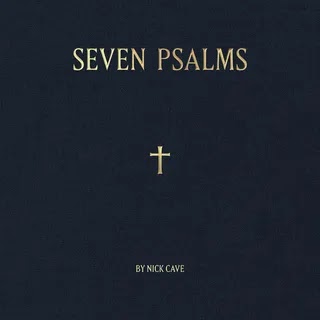A self-consciously minor work, this collection of spoken-word pieces is a brief but beatific respite during a particularly rewarding era of the songwriter’s long career.
Four decades after emerging as the seething frontman of the Birthday Party, Nick Cave has lately been making some of the most challenging and rewarding music of his long career. His recent albums, both with the Bad Seeds and as a duo with his right-hand Seed Warren Ellis, unfold in long contemplative stretches, slashed through occasionally with Cave’s old menace. The song forms have become progressively more open-ended; the narratives more diffuse and dreamlike; the instrumental arrangements softer and blurrier; the subject matter more openly preoccupied with questions of love and death. With each successive release, Cave’s work grows more distant from rock’n’roll and closer to religious music. The religion, admittedly, is an idiosyncratic one, whose high priest may also be its sole practitioner—a songwriter-mystic for whom sex, monsters, and bloodshed are as important as everlasting grace.
In contrast to the grand statements that Cave has produced in this vein, Seven Psalms is a self-consciously minor work. It consists of seven spoken-word pieces of one to two minutes each, with vaporous musical accompaniment from Cave and Ellis, and ends with one longer instrumental that is essentially a medley of the previous backing tracks, incorporating elements from each. The format and release strategy also encourage listeners to think of it as something other than the new Nick Cave album: a limited-edition 10” EP sold via Cave Things, a webstore that Cave has set up to sell art prints, Polaroid photos, T-shirts, and the like—what he calls the “incidental residue” of his creative practice. If he were a visual artist primarily, you might imagine these seven pieces hanging in a small and rushed-through anteroom to an exhibition of this distinct period in his work, included as interesting but inessential context for masterworks like 2021’s Carnage and 2016’s Skeleton Tree.
Cave flirted with spoken word on Carnage, in performances that were rich with drama and irony, taking breaks from his more traditional singing to cajole, plead, and intimidate. On Seven Psalms, the speeches are the main event: The fact there is music playing at all seems largely incidental. Cave is a much more reliable narrator this time around, ditching the previous album’s flashes of mania and hilarity in favor of solemnity and sobriety. You get the sense that this is the real Nick Cave delivering these lines, not some mad-eyed character he’s inhabiting. The music—a blend of synthesizers, gospel-inflected piano, and occasional wordless vocal harmonies, all swathed in heavy reverb—establishes a stately and ceremonious mood and never wavers from it, reinforcing the notion that Cave means what he says.
What he says usually has something to do with God, who seems a benevolent presence, with almost none of the Old Testament wrath that has often characterized His earlier appearances on Cave albums. “And though I have nothing but this prayer/That all will be revealed by and by/I pray someday my Lord you will appear/And lead me to your mansion in the sky,” Cave intones in one representative passage from “I Have Wandered All My Unending Days.” In another, from “I Come Alone and to You”: “I have nowhere left to go but to you, Lord/Breathless, but to you.” And from “I Have Trembled My Way Deep”: “I have stood at the threshold of your wonder/Bid me enter, Lord, allow me to unfold.”
Evaluating Seven Psalms as a pop record is likely beside the point; Cave seems to intend it straightforwardly as a sort of devotional aid. (The physical release comes with a prayer card.) But even if you lack the conviction in a higher power that animates it, you may find yourself moved by the strange beauty of his imagery—God as a stag whose antlers “rake lightning ’cross the sphere,” or a face in the morning mist held in place by the force of the narrator’s prayer—and by his unflagging belief in a goodness that transcends earthly horrors. He addresses the horrors most directly on “Such Things Should Never Happen,” which sketches out two mothers, a human woman and a sparrow, who lose their babies to early death, an unavoidable parallel to the deaths of Cave’s own sons in 2015 and 2022. “Such things should never happen,” goes the grave titular line. “But they do.”
As a Cave fan, it’s easy to miss the sex and monsters and bloodshed—not to mention the songs themselves—when playing Seven Psalms. It’s hard to imagine even the most devoted listeners returning to it regularly. But if anyone has earned the right to a brief and beatific respite, it’s Cave. And for the rest of the faithful: The man has a big catalog. If you want less God and more fucking, you can always listen to Grinderman.



0 comments:
Post a Comment